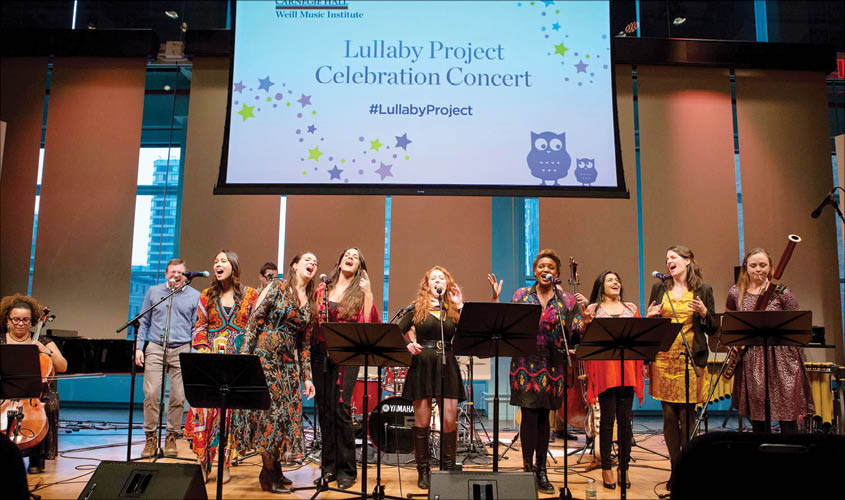The great German philosopher Schopenhauer said of music, “The inexpressible depth of music is due to the fact that it reproduces all the emotions of our innermost being, but…remote from its pain. We must attribute to music a far more serious and profound significance that refers to the innermost being of the world and of our own self.”
At the tender age of six, a bike accident resulted in me being hospitalised. The pain was excruciating. While the world trusted the doctors and modern medicine to solve my pain, my mother, desperate to help her daughter, had her own ideas. Sitting next to me, she urged me to sing to cope with the pain. As we sang in unison, what seemed like a simple effort by a parent to distract a small child was in fact my first glimpse into a new superpower that was transformative and unparalleled by anything I had experienced. Of course, today I understand what my mother surely understood, that with music my body could access abilities it couldn’t otherwise during my healing process. From that moment on, my journey with music was never the same. Music, for me, is not only a profound expression of one’s humanity but has the power to be a healing force.
I moved to the United States having trained in Indian classical vocal traditions. For me, the transformative power of our music, and music at large, was always at the heart of my belief system. As an Indian Ambassador of music to Carnegie Hall, one of world’s foremost musical institutions, I had the opportunity to teach music to incarcerated men at Sing Sing maximum security prison in New York through a programme called “Musical Connections”. Through music lessons, we would help workshop members channel their anger and frustration towards writing lyrics and musical expression. The more we worked with them through repetition, the more they found they could cope with anxiety and frustration through a creative outlet. Through Carnegie Hall’s programme at Sing Sing, we were using music as a tool to rehabilitate and convert negative energy into something constructive and artistic. With decades of efforts to reform those who are incarcerated and the world increasingly having become open to mindfulness and healing, it seems that it may be high time for music to be accepted and tried as a healing mechanism.
By law, in New York City, when a pregnant woman is admitted to prison, it is within her full rights to deliver and breastfeed her baby for a full year. However, at the age of one, the government takes possession of her baby and places him or her outside the prison with either the baby’s family or foster care. This is a devastating experience for both mother and child, as one can imagine. The trauma experienced by baby and mother is alike, and a mother’s uncertainty in knowing if or when she will see her baby again is both heartbreaking and a serious health risk. Carnegie Hall’s Lullaby Project works with mothers at Rikers—one of the world’s largest correctional institutions and mental institution located in the US—to write a lullaby so that the baby can carry this song with him/her wherever the baby goes. The mother feels a sense of fulfillment that she did whatever she could to give her child the precious gift of her emotions translated and captured into song. She hopes her precious child can at least listen to the song, not only to be comforted but also to trigger a memory of his/her mother’s voice—a small gift to a baby who leaves the prison aware that he or she may not see his or her mother again.
We are only now becoming more open to mental health issues, especially in regard to children. In this case, music helps define, capture and channel the bond and affection between mother and child in volatile human situations, and can help heal the trauma that is impending when such human bonds are broken. Once again, I offer that the time is now to explore the power of music to treat, prevent and heal.
Modern neuroscience and medicine are increasingly realising this power of music to heal. The range of emotions that are engaged through music, the engagement that takes place socially while playing, creating or listening to music, and the repetitive movements and rhythms associated with music can reinforce constructive neural networks that over time can counteract the destructive networks created by long-term physical or mental pain. Functional MRI studies have shown that music connects one’s attention and consciousness to the areas associated with self-awareness, empathy and reflection.
As a Hindustani-trained classical musician hailing from a longstanding heritage of South Asian philosophy and science, I am proud of this work and the emerging scientific thinking. I am neither surprised at the medical discoveries nor with our experience with the programmes described above. It seems the world is simply catching up.
I find music to be a unifying source. Every time it has proven to me that not only does it add positivity and peace to people’s life, but is a universal language in which “a soul sings and a soul hears”, as pointed out by the legendary Indian classical vocalist, Ustad Amir Khan.
The author is a Grammy-nominated musician
Any interested Indian arts organisation who would like to partner with Carnegie Hall and start the Lullaby Project in their communities can find out more information on the webpage: https://www.carnegiehall.org/Education/Social-Impact/Lullaby-Project

